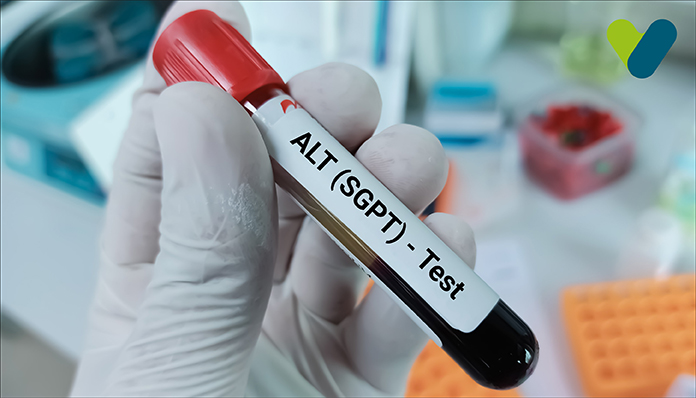The SGOT blood test is a type of test that belongs to the part of a liver profile. The SGOT test means serum glutamic-oxaloacetic transaminase that is commonly found in the liver. This enzyme is also called AST or aspartate aminotransferase. An AST blood test checks how well is your liver functioning by measuring the level of aspartate aminotransferase. SGOT is found in several areas including the kidney, muscles, heart, and brain of your body. If these areas are damaged, then your SGOT level may go beyond its normal value. Though SGOT high means your liver is damaged, there could be damage in other organs like the heart or kidney.

The cost of an SGOT test is Rs. 100Rs. 160. The price may vary depending on your location.
Please check the price of the SGOT test in Delhi/NCR, your nearby centers and other details.
Test Summary
| Also known as | AST or aspartate aminotransferase |
| Test Type | Blood |
| SGOT test includes | To check how well is your liver performing |
| Preparation | No special preparation is required |
| Reporting | Within 24 hrs |
| Test price | Please enter your location and other options on this page to view the cost of the SGOT test in Delhi/NCR, India |
| Also included in | Health Insurance Plans |
| Related tests | Complete blood count, SGPT, Ultrasound, glucose test, bilirubin test, coagulation panel |
Why This Test Is Recommended?
Your doctor will suggest this test if you have the symptoms of liver damage including:- Yellow skin or eyes called jaundice
- Tiredness
- Weakness
- Inflated belly
- Stomach pain
- Loss of appetite
- Itchy skin
- Dark-colored urine
- Clay-colored stool
- Inflammation in your legs and ankles
- Bruises
- If you have contacted with hepatitis virus
- Unrestraint consumption of alcohol
- Medicines that you are taking may cause liver damage
- Have a family history of liver disease
- You have obesity
- You are suffering from diabetes or metabolic syndrome
- If you have nonalcoholic fatty liver disease
Preparations Before the Test
You don’t need any special preparation before the test. Don’t take over-the-counter medications like acetaminophen (Tylenol) two days before your test. If you consumed these medications inform your doctor immediately. If you are taking other medications, then also intimate your doctor before doing the test. Drink adequate water the night before your test. If you stay hydrated, then the technician can easily draw blood from your vein.Test Procedure
- Once you reach your nearby lab or hospital, an experienced nurse or lab technician will take a sample of your blood usually from the upper vein of your arm.
- They will first tie a band around the upper part of your arm to identify the vein.
- They will clean the area with an antiseptic and insert the needle into your veins.
- Then the blood will be collected in a vial or tube.
- Once the blood is collected, the technician will remove the band and pull out the needle.
- They will place a bandage or gauze at the puncture site to prevent
What Are the Risks Associated with SGOT Or AST Test?
Since this is a blood test, hence it is safe and convenient. The risks are minimal. Some of them could be,- Bleeding
- Bruise
- Infection at the site
- Pain when the needle is inserted
- Dizziness
The test results
You will get the results within a few hours or on the same day. They are given in units per liter (units/L). Normal ranges are- Males: 10 to 40 units/L
- Females: 9 to 32 units/L
Higher-Than-Normal AST Levels Can Be Caused By
- Chronic (ongoing) hepatitis
- Cirrhosis (scarring and long-term liver damage)
- Blockage in the bile ducts
- Liver cancer
Very High AST Levels Can Be Caused By
- Acute viral hepatitis
- Liver damage due to drugs or other toxic substances
- A blockage in blood flow to the liver
Some other conditions may also elevate the levels of AST. These conditions are,
- Burns
- Heart attack
- Intense exercise
- Muscle injury
- Pregnancy
- Pancreatitis
- Seizures
- Surgery
- Some medications may cause a “false positive” result on the AST test.
- Diabetic ketoacidosis (Your body can’t make adequate insulin and thus, sugar enters your cells.)
- Some antibiotics, such as erythromycin estolate or para-aminosalicylic acid
